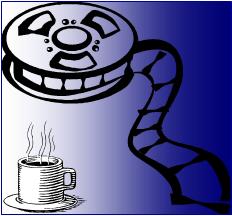

|
 |
The Passion of Ayn Rand
|
Please go to the new Coffee Coaster site implemented more gracefully in Wordpress. This page: http://brianrwright.com/CoffeeCoasterBlog/?p=2576 |
Helen Mirren ... Ayn Rand
Eric Stoltz ... Nathaniel
Julie Delpy ... Barbara
Peter Fonda ... Frank
Sybil Temchen ... Caroline
Tom McCamus ... Richard
Barbara Branden: On March 8, 1982, a line formed outside a funeral parlor in New York City. I stood there in the cold with hundreds of people waiting to say goodbye to an old woman few of them had ever met. Yet most of those people would have said she changed their lives. I had been her closest friend, and she mine. But all of that ended a long time ago.
The critics had called her a leader of a cult, a dangerous threat to public morality. Her name was Ayn Rand, and I loved her.
The Passion (1999) is a Showtime production, starring the incomparable Helen Mirren as Ayn Rand. The movie opens in a languid aerial approach to the night-time New York City streets, accompanied by a soft ensemble jazz melody, with Julie Delpy (Barbara Branden) voicing-over the above words. Julie is the perfect actor for Barbara Branden, and has the same exquisite, Dove®-skinned school-girl beauty... without the laser-eyed look that the later movement cultivated in Barbara's image for promotional literature.
As a leader of one of the many campus groups—Wayne State University, Detroit, Michigan—that sprouted roughly 10-15 years following the 1957 publication of Rand's magnum opus, Atlas Shrugged, I was thoroughly familiar with "the cult of Ayn Rand." I was an early adopter and proselytizer of her novels and ideas. But I did draw up short of plunging into the hierarchy of dogma and personality that characterized the early Objectivist organization, especially at the New York center.
These were heady times, and I can regale the readers with many a story of my own influences from the Land of Rand: from a) in high school finally being able to win arguments with my social(ist) studies teacher, b) learning from a lecture at the University of Texas in 1968 the crushing news that Nathaniel Branden and Ayn Rand had split up, c) deciding to quit political science at U of T, Austin, and enter engineering school in Detroit, d) forming the Wayne State Students of Objectivism during the early 1970s, e) committing heresy by helping to found the Michigan Libertarian Party and receiving notice of disavowal from Objectivist Central.
The nice thing about Barbara Branden's book, and this quite faithful film version of her story, is that the audience receives a condensed and archetypical view from the top of genuinely intelligent "people behaving badly"... and how that bad behavior spread throughout the land to many motley groups of "pretentious, intellectual mediocrities behaving badly."The Passion captures the incredible stiltedness and stark social fear that infused meetings of the faithful—so many of us wanted to be Howard Roark or John Galt or Dagny Taggart, and those who didn't aspire to such peaks were desperately afraid of being found wanting.
I remember my own encounter with the Inner Sanctum when Leonard Peikoff—Dr. Peikoff was the designated intellectual heir of Ayn Rand following the Branden split—came to the Detroit area ca. 1970 for a lecture, "Principles of Definition." [I was 'free, white, and 21'; most of my generation was getting high, listening to Led Zeppelin, and exploring the wonderful new world of free 'boogaloo and dingaling'. Those Rand types sure knew how to have fun!]
Anyway, in the question period, Peikoff asked if anyone cared to provide a definition of "freedom." In a spirit of wild abandon, I raised my hand and answered something like "absence of coercion." (I was plenty nervous: the assembled must have been in the 400-500 count.) I'll tell you what, that wonderful little man proceeded to literally ridicule me for having the temerity to say absence of something could be a definition of something. He gave no hint of benevolence, no tinge of mutual interest in moving toward an understanding, not even a gentle fatherly ribbing. Totally humiliating.
The movie shows how a typical dressing-down transpired in the Inner Circle—"the Collective" as Rand liked to call it—, which was a group of intimates of Rand and Branden, that at one time included Alan Greenspan[1]. The gatherings were common for the Randian coterie in New York City after her publication of Atlas Shrugged. The hopeful in-crowd person was grilled, usually Rand or Branden personally, often following some innocent comment about behavior, a book, a piece of music, a person in the public eye, e.g.:
Initiate: "I've been reading that cigarette smoking may cause lung cancer."
Leader: "Throughout human history, there have always been legions of would be dictators who hate pleasure, who despise the good for being the good, who would deny us the simple joys of life. Why would you want to go along with their attacks on something as intensely satisfying as smoking?"
Initiate: "Er. Well, okay. I mean, sure, it feels good, and it even looks cool, say, for someone like Humphrey Bogart in Casablanca. I'm just saying some studies have shown a link to health problems."
Leader: "Humphrey Bogart?! How can you possibly regard that communist alcoholic as cool? He's tied in with the entire collectivist establishment that runs the worst kinds of studios in Hollywood. Who brought you, tonight?"
Initiate: "I'm sorry, I'm sorry. Please forgive me. I only meant..."
Leader: "You only meant to denigrate man the hero, that bright point of light at the end of the cigarette that expresses the spark of creative passion for ... etc., etc. Please do not come back."
Believe me, I'm not kidding about how silly/scary some of these sessions could be, even out in the Hinterland. In the movie, they show a young woman, in front of Rand and Nathaniel Branden (Eric Stoltz), coming to tears for not having the correct interpretation of some behavioral peccadillo. It reminds you of a party-loyalty session on the collective farms in Russia and China.
But the story is largely autobiographical for Barbara Branden. We see a very important part of Rand's life, Rand's husband, Frank O'Connor (Peter Fonda), as well as Barbara and Nathaniel. The plot focuses a lot on the relationships among them. It starts with Barbara and Nathaniel coming to meet Ayn Rand at her home in California... after Nathaniel had written a most perceptive letter to Rand when he had read her book, The Fountainhead. Ayn and Nathaniel hit it off at first syllogism, then, in a few years, start "getting it on" above and beyond the call of reason.
Peter Fonda gives an Oscar-worthy performance as Frank, simply this incredibly decent, good-looking man who confesses to Barbara, toward the end of the movie, as the contradictions of human nature are catching up with everyone, "I never understood a word of it."
You have to thoroughly appreciate Barbara Branden's courage for writing the book, then driving to get this small gem of a movie made.[2] The performances of Delpy, Mirren, well... everyone is dead nuts, right on, that's the way it was, even more so. Even the roles of the two characters, who play "normal people" who help to lead the Brandens out of the Land of Rand are exemplary: Tom McCamus as Richard and Sybil Temchen as Caroline. The movie shows quite a bit of skin—at least Eric Stoltz's butt and Helen Mirren's supine naked bliss—perhaps too much so.
But in a way, it's necessary fleshage. Because of who Rand was and how sex was such a glorified activity in her "way things are s'posed to be." And, after all, it's the sex, the desire, the inimitable passion that makes Rand who she forever will be. This movie and the one I reviewed last week, Ayn Rand: A Sense of Life, should not be seen without the other. You see them both, you'll have the big picture of how she was and what she signifies. A scene at the end of The Passion is quite telling:
As Rand discovers Nathaniel's "disloyalty" to her, the inner circle is plotting how to banish and punish him. The Brandens have divorced. Barbara still works for the NB Institute—which was renamed to something else—and is in the room as Ayn pontificates at what a scoundrel Nathaniel is. Barbara throws up her hands in distress, exclaiming, "Stop it! Stop it! Just leave him be." Someone asks why. She says:
"Because it's the human thing to do."
[1] Biggest libertarian sellout in history to this point.
[2] Last week I reviewed Ayn Rand: A Sense of Life, which is the officially acceptable movie by the Ayn Rand Institute types, like Peikoff. No doubt they feel the exposure of the human side of Rand—at least the human side that is less flattering—is sacrilege. In their eyes, Barbara is like Nathaniel, a weak and immoral person whom Rand made possible. Not. Thank, Barbara; we Randian-human admirers needed this.
###
2010 January 14
Copyright © Brian Wright | The Coffee Coaster™
The Passion of Ayn Rand | Julie Delpy | Barbara Branden | Rand: Showtime
 |
 |
|||
| |